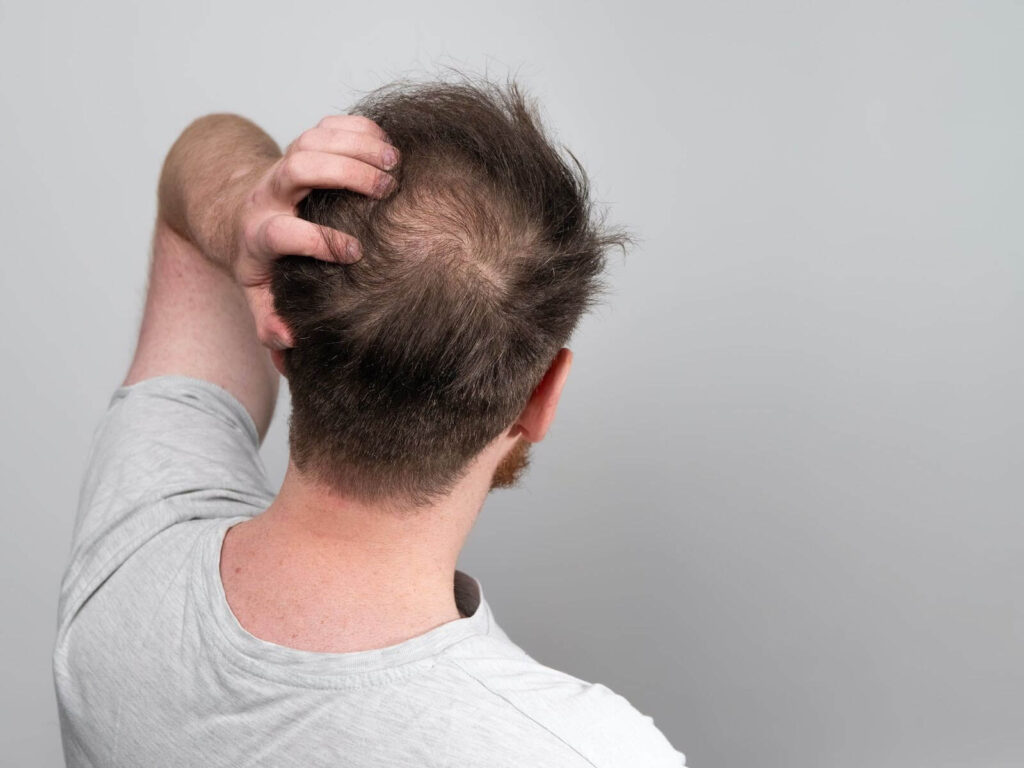As a leading provider of hair transplant solutions, Nashville Hair Doctor understands that one of the significant concerns among individuals considering a hair restoration procedure is the potential for scarring. We want to address this concern head-on and provide accurate information about the FUE hair transplant procedure, the risks of scarring, and how we mitigate these issues. Our Tennessee-based clinic uses expertise and advanced techniques to ensure that our Nashville Hair Doctor technicians leave you with natural-looking results and minimal hair transplant scarring. Contact us today for your free quote, which allows our technicians to evaluate your hairline and determine how our FUE hair transplant can help you without scarring.
Why Might You Want a Hair Transplant?
Hair loss can be a significant source of frustration and self-consciousness. Whether you’re dealing with a receding hairline, thinning hair, or bald patches, the impact on your confidence and overall well-being can be profound. Hair loss can occur for a variety of reasons:
Genetic Factors
The most common cause of hair loss is hereditary or genetic factors. Male-pattern baldness is the most common type of hair loss for men. Passed down from parents, this type of hair loss results in the progressive thinning of hair, a receding hairline, and even bald patches.
Medications and Treatments
Some medications and medical treatments can have hair loss as a side effect. Chemotherapy, radiation therapy, and certain drugs used to treat conditions like arthritis, depression, high blood pressure, and cancer can cause hair thinning or complete hair loss. Hair usually grows back once the treatment is complete. Talk with your primary care physician to understand how your medications impact hair loss and if another solution is available.
Physical and Emotional Stress
Severe physical or emotional stress can trigger hair loss. The stress disrupts the hair growth cycle, causing many hair follicles to enter the resting phase and eventually fall out. This condition is usually temporary, and hair growth resumes after the stress is alleviated.
Hairstyles and Hair Treatments
Excessive hairstyling, such as tight ponytails, braids, or the use of harsh chemicals for coloring, perming, or straightening, can damage the hair shaft and lead to hair breakage or traction alopecia. Prolonged use of these styling practices can cause permanent hair loss in the affected areas.
Whatever the reason, a hair transplant offers a reliable and long-lasting solution to restore your hairline and regain your self-esteem. We specialize in follicular unit extraction (FUE) hair transplants at Nashville Hair Doctor. This minimally invasive procedure involves extracting hair follicles from a donor area, typically at the back of the scalp, and implanting them into the areas where the hair is gone or thinning. Our highly skilled technicians meticulously perform the procedure to ensure optimal results.
Does a Hair Transplant Leave Scars?
We use NeoGraft FUE hair restoration at Nashville Hair Doctor for hair and beard transplants. This innovative and effective method of hair transplantation does not require stitches or staples and heals without any visible scarring. The fear of visible scars after a hair transplant is a legitimate concern. However, with the proper technique and expertise, you can minimize scarring. At Nashville Hair Doctor, our skilled technicians are trained in the latest advancements in hair transplantation, ensuring precision and minimizing the risk of scarring.
During an FUE hair transplant, we extract the donor follicles individually using tiny punches typically less than 1 millimeter in diameter. This approach avoids a linear incision. By extracting individual follicles, we create small puncture wounds that heal quickly and leave virtually no visible scar from the hair transplant. Our attention to detail and the expertise of our technicians contribute to natural-looking results without the telltale signs of a hair transplant.
Nashville Hair Doctor employs cutting-edge technology and techniques to reduce the risk of hair transplant scars further. We utilize highly trained NeoGraft technicians to ensure precision and accuracy during the procedure. This allows us to extract and implant hair follicles with minimal trauma to the surrounding tissues, resulting in faster healing and reduced scarring.
Additionally, our technicians are versed in the artistry of hair transplantation. Specialists meticulously place the extracted follicles to mimic the natural growth pattern, ensuring seamless integration with your existing hair. By following your hair’s natural angles, directions, and densities, we can create a result that appears completely natural and virtually removes hair transplant scar possibilities.
Recovery From an FUE Hair Transplant
After your FUE hair transplant at Nashville Hair Doctor, the healing process begins. You may experience some redness or swelling in the recipient and donor areas. Still, these side effects are temporary and typically subside within a few days. You can expect to safely return to your regular activities within 1-2 days. However, most patients prefer to wait 7-10 days for social interactions, as they want to wait until the punctures scab over and fall. After 10 days, you can expect to look similar to how you did before the procedure. The growth cycles begin after 2-3 months, and new hair growth appears.
For those wondering, “How long does scarring last after a hair transplant?” the answer can be that damage heals quickly when following your technicians’ suggested post-transplant care procedures. It’s essential to follow our aftercare instructions diligently to ensure the best possible outcome and minimize the risk of scarring. Some recovery instructions might be:
- Avoid Strenuous Activity: Avoid physical activities that may hinder healing for at least two weeks after the procedure. This includes activities that increase blood flow to the head, such as bending down at the waist. Additionally, postpone any strenuous exercises that lead to heavy sweating.
- Carefully Wash Your Hair: You can safely wash your hair after 48 hours following the hair transplant. We recommend applying shampoo indirectly by mixing a small drop in a cup of water and pouring the mixture gently over your head. Avoid direct contact with the showerhead during the first week. After the initial week, you can treat your hair normally.
- Expect Discomfort: It is normal to experience some swelling around the head on the third and fourth day after the procedure. To minimize swelling, we recommend keeping your head elevated for the first week, even while sleeping. Refrain from scratching the scalp to allow scabs to form undisturbed. Using a little conditioner can help alleviate itching. Avoid direct sunlight on the scalp for two weeks; wearing a loose-fitting hat (at least 3 days post-transplant) provides additional protection.
- Limit Alcohol and Smoking: Refraining from smoking for four weeks is also advised, as smoking can impact blood flow and hinder hair growth. Also, avoid drinking alcohol for at least five days to prevent interference with the blood supply to your head.
Our hair restoration specialists will provide detailed guidelines, including information about how to care for your scalp. By adhering to these instructions, you can maximize the success of your hair transplant and minimize any potential scarring.
If you’ve been considering a hair transplant but have concerns about scarring, Nashville Hair Doctor is here to address your worries. With our FUE hair transplant procedure and our commitment to utilizing the latest technology and techniques, we can provide natural-looking results and minimal scarring. Contact us today for a free quote and take the first step toward restoring your hairline and regaining your confidence.

